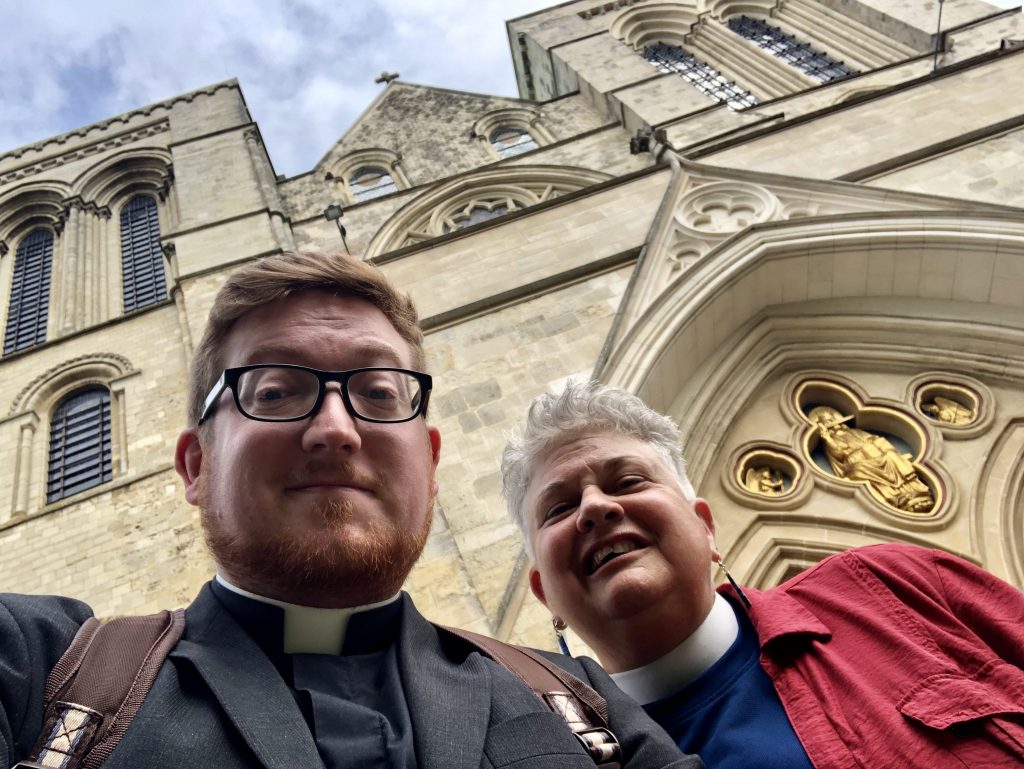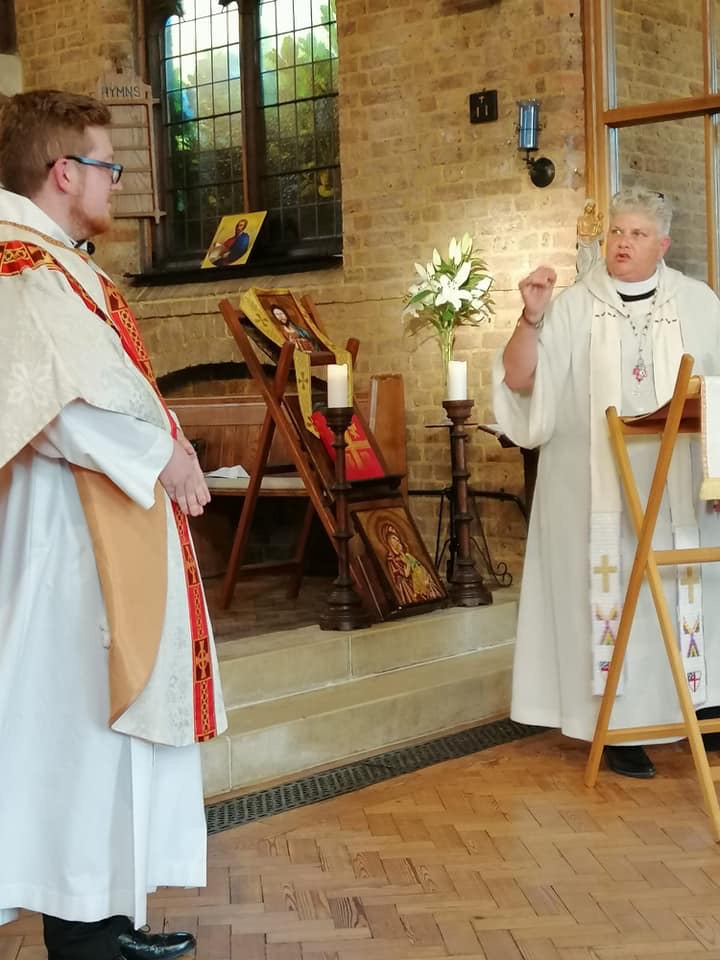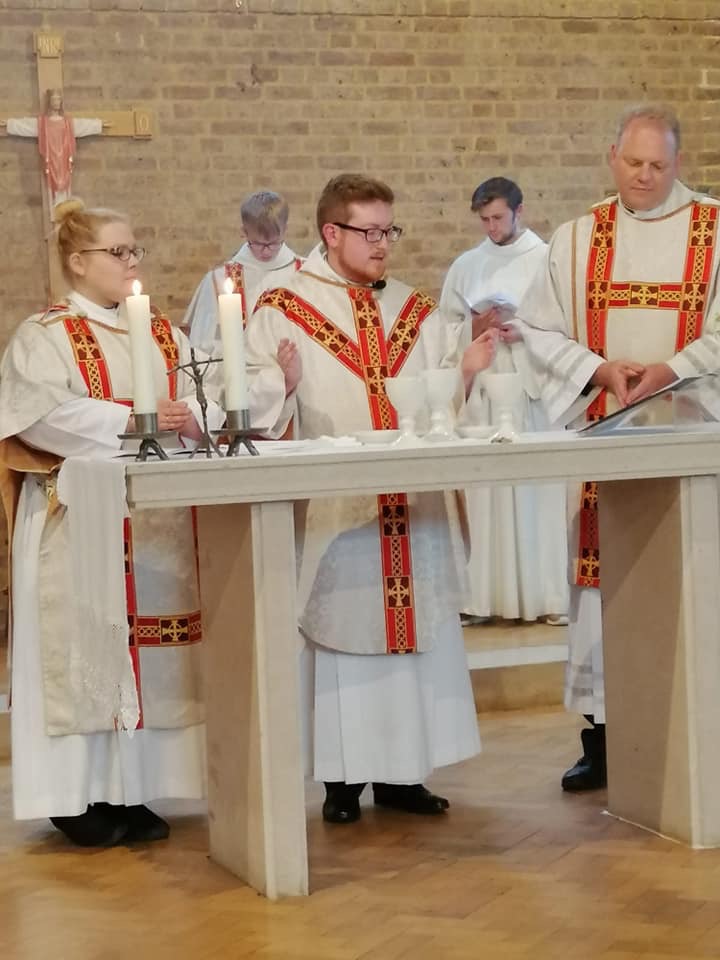Sermon by The Rev. Dr. Lauren R. Stanley, preached 12.24.21, Pine Ridge Episcopal Mission/St. Katharine’s, Martin, South Dakota
Do you all remember, way back when, when educators talked about school, they always mentioned the “three Rs”? You know, the three basics of what school was supposed to be about: reading, ’riting, and ’rithmetic?
Heaven help you if you — like me when I was but a child of about 6 years — questioned your teacher the nun, wanting to know why the three Rs weren’t Rs, because even at that age, I was bold enough to declare, writing starts with a W, not an R, and arithmetic starts with an A, not an R. “Just what kind of education was I getting?” (Note: The nun did not take that question well — not at all!)
Well, today, this holy day when we celebrate again the coming of the Christ Child, I want us to talk about not the three Rs of education, but the three Rs of Christmas.
They are, quite simply:
• Remembrance: This is the time each year when we remember this great thing that God did, Emmanuel, God with us, God choosing to be with us.
Love came down at Christmas,
Love all lovely, Love divine;
Love was born at Christmas,
Star and angels gave the sign.
(Verse 1, Love Came Down at Christmas, Christina Rosetti, Hymn 84, Hymnal 1982)
We have to start with Remembrance, because on this cold, dark night, in the midst of a cold, dark world where coronavirus continues to rage, where death is all too common, where famine and war and in-fighting and out-fighting seem to be the rule of the day, we need to reach back into our memories and remember that indeed, Love came down at Christmas …
Theologian Madeleine L’Engle puts it elegantly in her poem First Coming:
He did not wait till the world was ready,
till men and nations were at peace
He came when the Heavens were unsteady
and prisoners cried out for release.
He did not wait for the perfect time.
He came when the need was deep and great.
He dined with sinners in all their grime,
turned water into wine. He did not wait
till hearts were pure. In joy he came
to a tarnished world of sin and doubt.
To a world like ours, of anguished shame
He came, and his Light would not go out.
He came to a world which did not mesh,
to heal its tangles, shield its scorn.
In the mystery of the Word made Flesh
the Maker of the stars was born.
We cannot wait till the world is sane
to raise our songs with joyful voice,
for to share our grief, to touch our pain,
He came with Love: Rejoice! Rejoice!
(Madeleine L’Engle, “First Coming,” published in The Ordering of Love, 2005)
• When the going is tough, by remembering, we are Reminded — reminded that once that love arrived on Christmas — in the form of a baby born in a stable to parents who were not rich, not famous, just plain old ordinary folks — that love isn’t going anywhere! As Presiding Bishop Michael Curry says, “God is not finished with the world yet.” (The Most Rev. Michael B. Curry, Christmas Message 2021, published 17 December 2021)
“Worship we the Godhead,
Love incarnate, Love divine;
Worship we our Jesus:
But wherewith for sacred sign?”
(Verse 2, Love Came Down at Christmas, Christina Rosetti, Hymn 84, Hymnal 1982)
Michael Gerson, a political columnist for The Washington Post, and political consultant in numerous presidential administrations, published a column on Christmas Eve, disclosing for the first time publicly that he has cancer and that treatments might be coming to an end. In his reflection on Christmas, with this knowledge, he wrote:
He is a God who goes to ridiculous lengths to seek us.
He is a God who chose the low way: power in humility; strength perfected in weakness; the last shall be first; blessed are the least of these.
He is a God who was cloaked in blood and bone and destined for human suffering — which he does not try to explain to us, but rather just shares. It is perhaps the hardest to fathom: the astounding vulnerability of God.
And he is a God of hope, who offers a different kind of security than the fulfillment of our deepest wishes. He promises a transformation of the heart in which we release the burden of our desires, and live in expectation of God’s unfolding purposes, until all his mercies stand revealed.
(Michael Gerson, “This Christmas, hope may feel elusive. But despair is not the answer,” The Washington Post, Dec. 24, 2021)
This is the reminder we need, this day and every day, that God does go to ridiculous lengths to seek us, and the God is a God of hope who transforms us and everything around us, because God isn’t finished with us yet.
• Once we remember that love indeed came down to live among as one of us, once we are reminded that no matter how hard life seems, how dark it is, that same love isn’t going anywhere, we are led to the third R, Response.
Love shall be our token,
Love be yours and love be mine,
Love to God and neighbor,
Love for plea and gift and sign.
(Verse 3, Love Came Down at Christmas, Christina Rosetti, Hymn 84, Hymnal 1982)
Theologian, educator and civil rights leader Howard Thurman in 1973 wrote “The Mood of Christmas,” which represents what our response to this great gift can and should be:
When the song of the angels is stilled,
When the star in the sky is gone,
When the kings and princes are home,
When the shepherds are back with their flock,
The work of Christmas begins:
To find the lost,
To heal the broken,
To feed the hungry,
To release the prisoner,
To rebuild the nations,
To bring peace among others,
To make music in the heart.
(Howard Thurman, The Mood of Christmas, 1973)
This is how we are called to respond to this great gift that came to us, that comes to us, that will always come to us … to go into the world and do all that God asks us to do.
By doing the work of Christmas, all that Thurman listed and even more, can take place, can become true.
God came to be with us as one of us in order to fulfill all of God’s promises.
As Youth Poet Laureate Amanda Gorman taught us in her poem for the inauguration last January,
When day comes, we step out of the shade of flame and unafraid.
The new dawn balloons as we free it.
For there is always light, if only we’re brave enough to see it.
If only we’re brave enough to be it.
(Amanda Gorman, “The Hill We Climb,” poem for the Inauguration of Joe Biden, Jan. 20, 2021)
Love indeed came down at Christmas, and if we remember that, if we are reminded that that love isn’t done with us yet, if we respond by doing the work of Christmas every day of our lives, then, I pray, we will be the light that God is calling us to be.
Amen.







